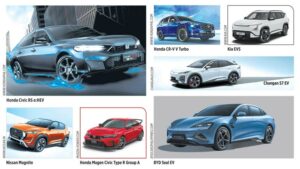Cars have evolved far beyond simple transportation tools to symbols of identity and lifestyle. A study published in the open-access journal Transport Reviews said that the decision to purchase a car and the type of vehicle selected are influenced by values, societal norms, and lifestyle aspirations.
In professional settings, the type of car a person drives can influence perceptions of success and financial stability. Younger individuals, particularly those between the ages of 17 and 23, see car ownership as a symbol of freedom and independence.
At the same time, rising environmental awareness has changed consumer attitudes toward vehicles as more buyers now seek brands that align with sustainability goals. As a result, electric vehicles (EVs), once seen as niche products, are now becoming mainstream, with major automakers increasing investments in their development.
For instance, the Honda Civic RS e:HEV is the first electrified variant of this model. It features a 2.0-liter four-cylinder engine with 16 valves and a double overhead cam, paired with two electric motors and an electrical continuously variable transmission (E-CVT), along with a high-efficiency lithium-ion battery. The introduction of this model is intended to attract customers who are interested in both performance and eco-friendly vehicles, aligning with global trends towards greener mobility solutions.
From interior to exterior
The design and functionality of modern cars significantly impact the lifestyles of their owners, often shaping not just the driving experience but also the decision to purchase. A study from the Journal of Product Innovation Management notes that emotional considerations often outweigh practicality, with comfort being a major influence on buyer choices.
Modern car seats are engineered to be adjustable and supportive. They often feature multiple adjustments for height, depth, and lumbar support to accommodate various body shapes and sizes. According to a study published in the peer-reviewed journal PLOS One, a well-designed seat can significantly reduce discomfort during long drives.
McKinsey & Company reported that cabin experience is projected to dominate headlines with 71% of automotive executives expecting vehicle interiors to become more important. Features like ample storage and flexible seating arrangements turn cars into multifunctional spaces for both work and leisure. Families, for example, often opt for larger vehicles that provide comfort for adults while accommodating children — as seen in Mitsubishi’s new seven-seater SUV DST Concept.
Compact vehicles, on the other hand, focus on efficiency without compromising space. The Nissan Magnite, a recent addition to the subcompact crossover market in the Philippines, offers a surprisingly spacious interior despite its size. Built on the CMF-A+ platform, it demonstrates how thoughtful design can maximize space within smaller cars.
Customization options also factor in the decision-making process. The 2024 Consumer Automotive Personalization Survey revealed that over 40% of potential buyers consider vehicle personalization important when making a purchase. Customizable features like color choices, upholstery materials, and technology options allow owners to express their personal style. For instance, Mazda Philippines now offers its AutoExe customization program for buyers looking to personalize their vehicles.
Exterior design is equally important, influencing both aesthetics and performance. Streamlined body shapes improve aerodynamic efficiency, which enhances ride quality by reducing wind resistance and creating a quieter cabin.
Take the limited-edition CR-V V Turbo, for example. While the overall styling remains consistent with the standard CR-V design, Honda has enhanced the CR-V V’s exterior with sporty accessories such as an exhaust pipe finisher, a front aero bumper, and a rear under spoiler, all of which contribute to a more dynamic and premium appearance without sacrificing the vehicle’s signature style.
Inside, the CR-V V Turbo is equipped with practical accessories such as a seat back protector, cargo tray, and door visor. Under the hood, the car is powered by a 1.5-liter, four-cylinder VTEC Turbo engine, producing an impressive 190 PS and 240 Nm of torque. This engine is paired with a CVT that drives the front wheels, delivering smooth acceleration and fuel efficiency for both city and highway driving.
Additionally, the new CR-V V Turbo is equipped with Honda Sensing, the brand’s advanced driver-assistance system (ADAS), which includes safety features such as collision mitigation braking, adaptive cruise control, and lane-keeping assist.
For performance enthusiasts, Honda has unveiled the Mugen Civic Type R Group A at the 2024 Philippine International Motor Show (PIMS). The special edition of the Civic Type R features enhanced aerodynamics, a sportier look, and performance upgrades with only five units available.
Car connectivity
Modern vehicles are increasingly equipped with advanced technologies to improve safety, convenience, and entertainment. A McKinsey Mobility Consumer Pulse Survey found that demand for in-car connectivity continues to rise, with half of car buyers expecting more advanced digital features in their vehicles.
The survey also found that half of all car owners are expecting more advanced in-car digital features in the future. EV buyers, in particular, are highly interested in connectivity, with 69% stating they want more of these solutions compared to 47% of traditional car buyers.
Nearly half of car buyers now consider features like Apple CarPlay or Android Auto essential. These systems have become integral for drivers who want the same kind of functionality in their cars as they do with their smartphones. In response, car manufacturers are equipping their vehicles with high-speed connectivity options like 4G and 5G to enable smooth integration with phones and other devices. This connectivity allows drivers and passengers to stream content directly from their cars, turning travel time into a more enjoyable experience.
Tech-driven features that boost convenience are also gaining traction, like intelligent parking systems, in-car payment options, and machine learning-based personalization tools. Such systems track user preferences and behaviors, offering customized playlists, movie suggestions, or even audiobooks, based on the journey.
Latest car models such as the Changan S7 EV and the Kia EV5 are equipped with a state-of-the-art infotainment system and support seamless smartphone connectivity through Android Auto and Apple CarPlay.
The new BYD Seal EV also supports wireless charging for two devices, Apple CarPlay and Android Auto, as well as intelligent driver aids like lane departure warning, adaptive cruise control, and automatic emergency braking.
Meanwhile, Honda CONNECT, the brand’s advanced telematics platform, enhances connectivity and safety further. Through a smartphone app, drivers can access real-time diagnostics, vehicle alerts, and features like remote control, geofencing, speed notifications, and Find My Car. The system also emphasizes safety with features like collision detection and security alarm monitoring. — Mhicole A. Moral






